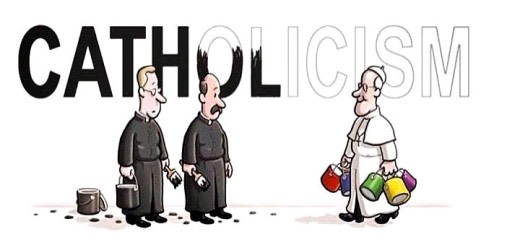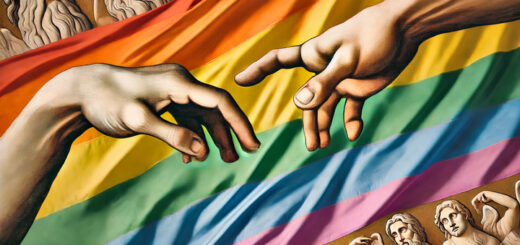Homosexuality and Christianity: an incompatibility without foundation
 Reflection of the Spanish theologian Juan José Tamayo taken from Adista documents n.70, 15 October 2005
Reflection of the Spanish theologian Juan José Tamayo taken from Adista documents n.70, 15 October 2005
The relationship between homosexuality and Christianity is a complex theme on which we generally do not speak with serenity and balance. It is faced with stereotypes, prejudices and mythical conceptions, linked to a religious and civic education characterized by homophobia. There are no objectivity, rigor and respect in the treatment of the theme.
There is a tendency to disqualify. People pronounce before inquiring, and not to try to understand but to condemn.
The Catholic Church is one of the international organizations that has repeatedly pronounced publicly on the homi-sexuality, and always in a negative and condemnation tone. Other international bodies, such as the World Health Organization, the Council of Europe, the European Parliament, etc., have shown themselves more inclusive, tolerant and open. The first fact to consider in this matter is the large pluralism existing between the groups of Christians and Christians (here I will limit myself to Catholics).
On the one hand there are the positions of the Catholic hierarchy in bulk, without cracks, at least outside, and some Catholic organizations that ethically consider the mere inclination of the homosexual person ethically disordered; qualify homosexual practice as immoral and abominable; They accuse gays and lesbians of being depraved and morally bad people, a virus for society; homosexual marriages are compared to false coins, defining them in these terms: corruption and legal falsification of the marriage institution, regress on the path of civilization, serious injury to the fundamental rights of marriage and family, attack on the harmony of creation, breakage of social stability in its deeper essence and distortion of the image of the human being and the family. In the same way, they express their pain for the damage caused to children given by adoption to these "false couples".
Dall’altra parte vi sono le posizioni di numerosi gruppi di teologi, teologhe, comunità di base, lesbiche e gay cristiani che dissentono dalla gerarchia, definendola aggressiva e totalitaria. Questi gruppi difendono un modello di convivenza caratterizzato dal rispetto e dalla libertà, giustificano l’omosessualità come una forma legittima di esercitare la sessualità, rivendicano il diritto delle coppie omosessuali a contrarre matrimonio sia civile che religioso, in quanto unità di convivenza e di affetto a parità di condizioni con le persone eterosessuali, e all’adozione.
I punti di accordo tra le due parti sono minimi e la frattura non potrebbe essere maggiore. Cercando di oggettivare il tema, ritengo che il problema di fondo sia radicato in una serie di distorsioni che passo ad esplicitare.
La prima è la tendenza a considerare come legge naturale e divina quelle che in realtà sono norme ecclesiastiche. È la strategia dei vescovi di imporre a tutta la cittadinanza una concezione del matrimonio e della sessualità che appartiene alla dottrina morale della Chiesa cattolica di una determinata epoca storica oggi in via di revisione.
The hierarchy claims to put limits to legislators in the exercise of their function, accusing them, in the case of the law that regulates homosexual marriage, of going against natural law, of flagrantly denying fundamental anthropological data and carrying out an authentic subversion of the most elementary moral principles of the social order. What is subject to this position is the resistance that recognizes the non -confessional state and to accept the ideological, religious and moral pluralism of Spanish society.
The second distortion, a consequence of the previous one, is the non -acceptance of a secular ethics, valid for all citizens and towns, regardless of their faiths and ideologies. The process of secularization has established a justified separation between the religious sphere and the secular one that the bishops would do well to respect, collaborating, starting from here, in common research of some minimal foundations of secular ethics shared by all citizens and towns, in compliance with the morals of the different religious traditions.
The third distortion is internal to Catholicism itself and fundamental from a theological point of view. It consists of a fundamentalist reading of the biblical texts relating to homoses-syuality. I do a couple of examples.
The first is that of Sodoma and Gomorra (Gn 19.1-11). Based on traditional interpretation, the sin of the inhabitants of these two cities would have been to entertain homosexual relationships. However, according to the interpretation that today seems most correct, what is condemned is not the homosexuality in itself, but the hardness of the heart of the inhabitants of Sodom, the violence of man on man, who implies a humiliation, the offense to foreigners that Lot had accepted at home by exercising the virtue of hospitality.
The North American theologian Alice Winter shows that the sin of the two cities materializes in a system of injustice and oppression defended by a small elite to guarantee a life of wealth and idleness behind the poor. Ultimately, it is the lack of hospitality towards foreigners what is condemned.
The second example are the prescriptions of the Levitician. In a song of this book (18.22), abominable male homosexuality is defined. In another (20,13) it is said that, if a man lies with another man, both commit abominable and must die. The two texts must be read in their context.
In Jewish legislation the death penalty is ordered for those who cursed their parents, for adulterers, incestuous and for those who commit sin with animals. It is also considered abominable to have sexual relationships with a woman during menstruation.
On the contrary, he allows himself to sell his daughter as a slave, to own slaves, males and females, provided that they are acquired in nearby nations. The death penalty is established for those who transgress the precept of Saturday's rest and dare to work the seventh day. Prohibits access to the altar to each person with some physical defect. Do you have to interpret these texts in their literal sense? Definitely not.
What such prohibitions want to highlight is the peculiar character of the Jewish people as people of God who stand out from other peoples. The condemnation of homosexuality as of other practices is not based on sexual reasons but on religious reasons. The problem does not arise on the moral soil, but on that of ethnic identity and purity.
I believe that the conflict or the incompatibility between Christianity and homosexuality lacks such an anthropological basis as theological. I agree with the Dutch theologian Edward Schillebeeckx on the fact that there is no Christian ethics with respect to homosexuality. It is a human reality that must take on as such without appealing to exclusion moral assessments.
In my opinion, there are no specifically Christian criteria to judge it. The incompatibility in Christianity is not given between being Christian and being homosexual, but between Christian being and not solidarity, between Christian being and being homophobic, or, as the Gospel says, between serving God and serving money.
The current Christian theology of marriage has been developed in a culture, a society and a homophobic and patriarchal religion, which imposed the submission of the woman to the man and the exclusion of homosexuals from the experience of love.
Today there is a need to reformulate this theology, so that it is inclusive of the different sexual tendencies that must be experienced starting from freedom, respect for otherness and within equal relationships.






